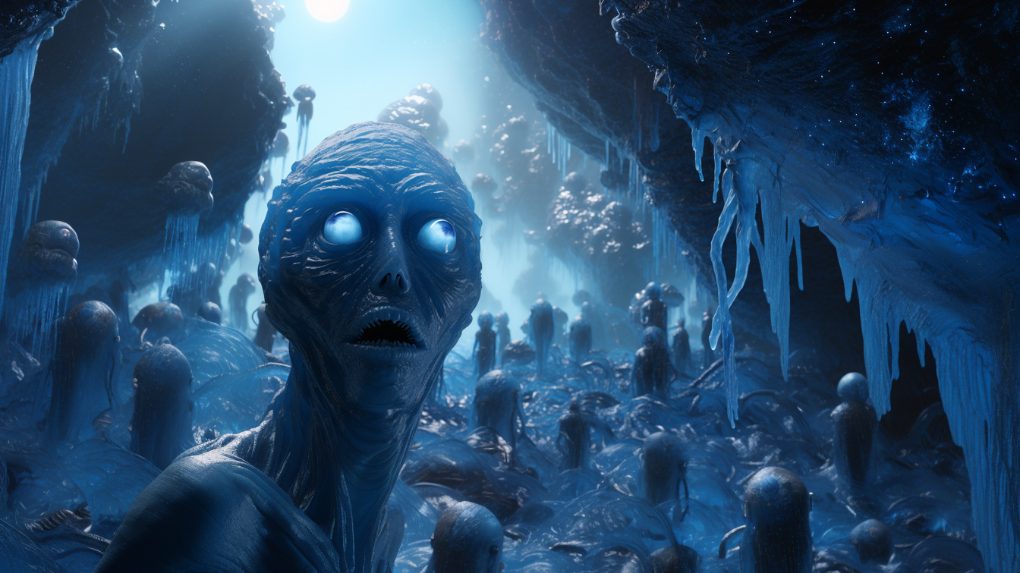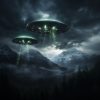From ancient myths to futuristic space operas, humanity’s obsession with extraterrestrial life has given birth to a universe of compelling stories.
Dive into the enthralling world of alien encounters, intergalactic civilizations, and the profound questions they pose about our very existence. Ready to embark on an otherworldly literary journey? Read on!
The Intrigue of Extraterrestrial Life
A Brief Introduction to Science Fiction
Science fiction has long been the playground for our imagination. From pondering the possibilities of advanced civilizations to exploring the ethics of encountering other species, it’s a genre that invites readers to consider the vastness of the universe. While the line between fiction and reality can sometimes blur, these books about aliens offer a fascinating look at what could be out there.
Understanding Intelligent Life Concepts
The idea of intelligent life beyond our world is tantalizing. Are they curious about us as we are about them? The books in this realm challenge our notions of intelligence, consciousness, and the idea of what makes a species “sentient.” Through imaginative stories, authors paint vivid pictures of civilizations, cultures, and mind-blowing technologies that might exist beyond Earth.
The Classics of Science Fiction
Alien Invasion: The Powerhouses of Sci-Fi
No discussion of books about aliens would be complete without mentioning some of the quintessential alien invasion stories. H.G. Wells’ “War of the Worlds” remains a touchstone, its tale of Martians attacking Earth both thrilling and terrifying. Orson Scott Card’s “Ender’s Game” introduces us to the Formics, an alien race whose war with humanity has lasting consequences. These are tales of survival, courage, and understanding the nature of the enemy.
Human Colonists: Venturing the Stars
The universe is vast; in these tales, humanity reaches out to find new homes among the stars. From tales like “Red Mars” by Kim Stanley Robinson, which explores human colonists terraforming and settling on Mars, to classics like Robert Heinlein’s “Starship Troopers,” where soldiers defend against alien insects, these books grapple with the challenges, hopes, and perils of colonization.
The Alien Presence: Sentient Species Among Us
What if aliens were already here, hidden among us or perhaps openly coexisting? Novels like Arthur C. Clarke’s “Childhood’s End” explore the profound impact of a peaceful alien presence on Earth. Meanwhile, “The Left Hand of Darkness” by Ursula K. Le Guin takes readers to the icy planet of Gethen, where the main character encounters a race of androgynous beings and is challenged by their societal norms and sexual prejudice.
Related: Aliens Are Demons – Investigating The Belief Of Some That UFOS Are Satanic Entities
Delving into Hard Science Fiction
What is Hard Science Fiction?
Hard science fiction takes a more rigorous approach to its narrative, emphasizing scientific accuracy and logic. Think of it as the more studious cousin of general sci-fi. These stories weave complex, realistic elements of science with gripping tales of alien life and interstellar journeys.
Masterpieces in Deep Space Exploration
When it comes to plunging into the vastness of deep space, few do it better than Alastair Reynolds with his book “Revelation Space”. It explores a universe filled with ancient alien life forms and the relics they’ve left behind. Then there’s “Rendezvous with Rama” by Arthur C. Clarke, where an alien starship enters our solar system, inviting humans to discover its secrets.
Human Mind Meets Alien Thought
Exploring how the human mind interacts with alien consciousness is a theme found in many memorable books. “Blindsight” by Peter Watts presents us with a future where humans encounter a truly alien entity, challenging our very notions of consciousness. On the flip side, “Solaris” by Stanislaw Lem deals with a sentient planet that interacts with the human crew sent to study it, delving deep into the human psyche and the nature of communication.
Stories Beyond Our Solar System
Interstellar Journeys: Traveling Among the Stars
Journeying through the stars is no small feat. Books like “Hyperion” by Dan Simmons weave intricate tales of pilgrims traveling to a distant world, while “The Forever War” by Joe Haldeman delves into the effects of time dilation on human soldiers as they navigate an interstellar war.
Ancient Alien Life Form: Debunked or Confirmed?
We’ve always been curious about the origins of ancient structures on our planet. Could they be the work of extraterrestrials? “Chariots of the Gods?” by Erich von Däniken speculates on this very premise. Though controversial, it invites readers to imagine the influence of extraterrestrial life on human history.
The Worlds We Might Encounter
The thrill of discovering new worlds and their ecosystems is an irresistible allure. In “Dune” by Frank Herbert, the desert planet Arrakis with its precious spice becomes the focal point of a galactic struggle. On the other hand, “Pandora’s Star” by Peter F. Hamilton introduces us to a plethora of worlds unlocked by human ingenuity, some of which harbor strange and formidable alien species.
Alien Language and Communication
When Humans and Aliens Talk
One of the most riveting aspects of encountering alien species is figuring out how to communicate. How do you converse with a being whose frame of reference might be entirely different from yours? In “Story of Your Life” by Ted Chiang, the basis for the film “Arrival”, a linguist grapples with an alien language that doesn’t follow the linear constructs of time. Her journey of understanding reshapes her entire perception of life and existence.
The Film “Arrival” and its Impact
The film “Arrival”, adapted from Chiang’s story, has amplified the discussion about the complexities of alien communication. The portrayal of linguists as the frontline warriors, tasked with deciphering the alien intent, highlighted the significance of language in establishing peaceful contact. It’s a sobering reminder that our first encounter with an extraterrestrial species may be more about understanding and less about firepower.
Deciphering Alien Text: A Challenge to Our Intellect
The dream of many a sci-fi enthusiast is to get their hands on a genuine alien text. Novels like “A Deepness in the Sky” by Vernor Vinge explore the intricacies of understanding an alien race through their language, technology, and culture. These stories compel us to reflect on the hurdles and rewards of true inter-species comprehension.
Also read The Reptilian Aliens Conspiracy Theory: Fact or Fiction?
The Rise of Space Opera and Its Influence
The Golden Age of Science Fiction Books
Science fiction books have gone through various evolutions, but one of the most significant was the rise of space opera. These grand tales, often involving large casts of characters, epic interstellar journeys, and galaxy-spanning conflicts, have enthralled readers for generations. Think of classics like “Foundation” by Isaac Asimov or the sweeping sagas penned by New York Times bestselling authors like Lois McMaster Bujold.
Star Trek: Pioneering a Universe of Hope and Exploration
One cannot talk about space opera without mentioning “Star Trek.” What started as a TV show soon became an iconic universe. Its hopeful vision of the future, where characters of diverse backgrounds come together to explore and understand the universe, has shaped the perspectives and own views of countless fans. Its influence can be felt not just in television and films, but in novels and other forms of media as well.
Characters We Hold Close to Our Hearts
The true strength of a good science fiction novel often lies in its characters. Whether it’s a little girl with the fate of the universe resting on her shoulders or a seasoned scientist thrust into an intergalactic conspiracy, these characters become our anchors. We mourn their deaths, cheer for their victories, and see reflections of our own hopes and fears in their journeys.
Human History and the Alien Influence
Were We Alone?
As we dive into the annals of human history, questions about alien influence inevitably surface. Were the pyramids built with the help of extraterrestrials? Did ancient civilizations have knowledge imparted by visitors from the stars? While mostly speculative, these theories, both in fiction and pseudo-science books, stoke our collective curiosity.
Theories and Novels about Past Encounters
There’s no shortage of literature theorizing about past encounters with aliens. In “The Gods Themselves” by Isaac Asimov, the story revolves around an alternative universe with its own set of physical laws. The collaboration between humans and the alien trio, who inhabit this universe, forms the crux of this compelling narrative. Meanwhile, “The Sparrow” by Mary Doria Russell paints a haunting picture of a first-contact mission led by a Christian missionary, hinting at the deep intertwining of human beliefs and extraterrestrial encounters.
Government Corruption: Hiding Alien Contact?
The notion that governments might hide evidence of alien contact has been a popular trope in fiction and conspiracy theories alike. Works like “The Three-Body Problem” by Liu Cixin touch upon the governmental and societal implications of impending alien contact. The suspenseful narrative, coupled with the cultural and political intrigue, offers readers a gripping take on the potential consequences of meeting an advanced extraterrestrial civilization.
Encountering Alien Civilizations
Growing Intergalactic Civilization Concepts
The idea of a vast, growing intergalactic civilization, with myriad species and cultures intermingling, is a thrilling one. Ian M. Banks’ “Culture” series delves into a post-scarcity, interstellar society where humans, machines, and various alien races coexist. The exploration of societal norms, ethics, and the challenges of such a vast civilization form the crux of this captivating series.
Stories of the Next Generation of Intergalactic Travelers
As we look to the future, tales of the next generation taking on the mantle of space exploration ignite our imaginations. “Aurora” by Kim Stanley Robinson portrays a multi-generational ship sent to colonize a distant star system, grappling with the unforeseen challenges of such a long journey. Similarly, “Proxima” by Stephen Baxter introduces us to human colonists on a neighboring star, facing the enigmas of an alien planet.
Civil War, Prejudice, and Extraterrestrial Interventions
Conflicts are sadly an intrinsic part of our nature. But what happens when they are set against the vast canvas of space, with alien races thrown into the mix? Octavia E. Butler’s “Lilith’s Brood” series delves into the aftermath of a nuclear war on Earth, where an alien race offers salvation, but at a steep price. The blending of cultures, genes, and the clash of ideologies form the epicenter of this gripping narrative.
The Evolution of Science Fiction Cities
From Utopia to Dystopia: The Tale of Sci-Fi Cities
The portrayal of cities in science fiction has always been a blend of hope and cautionary tales. From gleaming metropolises soaring among the stars to dystopian wastelands reflecting our worst fears, these urban settings play pivotal roles in many novels. Cities become characters in their own right, shaping the lives of the children, scientists, and adventurers who inhabit them.
The First Book That Made Cities Come Alive
Many fans trace their love for science fiction cities back to their very first book. Perhaps it was the sprawling cityscape of Trantor in Asimov’s “Foundation” series or the gritty underbelly of Neuromancer’s Sprawl. These vividly crafted cities serve as playgrounds and battlegrounds, setting the stage for tales of intrigue, discovery, and conflict.
The Soul-Stirring Tales of Interstellar Journeys
Embarking on an interstellar journey isn’t just about traversing vast cosmic distances; it’s also a deeply personal voyage that often grapples with existential themes. New York Times bestselling authors have time and again delivered gripping narratives that throw characters into the uncharted voids of space.
Cities Among the Stars: The Ultimate Frontier
The imagination of a city in space — whether a colossal starship or a metropolis built on a distant planet — captures the essence of human ambition. But as these towering urban landscapes rise against the backdrop of the cosmos, they often also become crucibles for human emotion.
The Inevitability of Death in the Vast Expanse
Space, with its inherent dangers, is a poignant reminder of mortality. As characters embark on these epic journeys, they confront not only the vastness of the universe but also the fragility of life. The dance with death, either their own or that of companions, adds a raw emotional depth to their adventures, making their stories resonate deeply with readers.
Concluding Thoughts
The Melding of Science and Fiction
The magic of books about aliens lies in their ability to blend rigorous science with riveting fiction. They take abstract concepts from astrophysics, biology, and linguistics, weaving them into tales that captivate the mind and heart. Whether it’s the complexities of faster-than-light travel or the intricacies of alien DNA, these stories push the boundaries of what we know, urging us to learn and imagine more.
The Future of Alien Representation in Literature
From monstrous invaders to benevolent guides, the representation of aliens in literature has evolved significantly. As we move forward, stories will likely reflect our growing understanding of the cosmos and life’s potential diversity. It won’t just be about “us versus them” but about a shared journey of discovery and understanding.
Humanity’s Quest for Understanding and Discovery
Our fascination with extraterrestrial life reflects a deeper yearning: to understand our place in the cosmos. At its heart, every alien story is also a story about us — our hopes, fears, and insatiable curiosity. Whether we dream of peaceful first contact or brace for intergalactic challenges, these narratives underscore the universal human drive to explore, understand, and connect.
Recommended Further Reading:
Auto Amazon Links: No products found.



